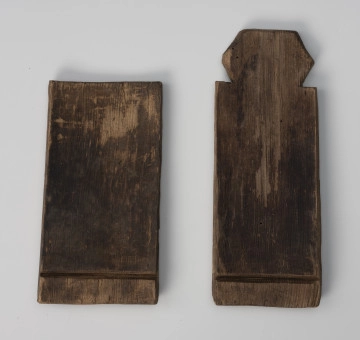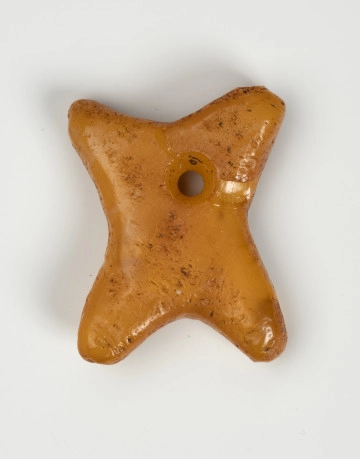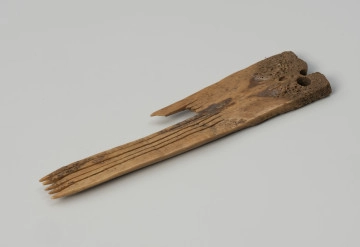
Bucket stave
901 — 1200
National Museum in Szczecin
Part of the collection: Middle Ages
Archaeological studies of Szczecin's Podzamcze go as far back as the mid 1950s. However, works in the area of quarter 5 began in 1986. Long-term, permanent exploration of individual trenches continued until 2001, resulting in the collection of many thousands of movable artefacts. One of them is a set of keys connected by two oval links discovered in Trench VI, in layer XXXII, dated to the 4th quarter of the 12th century, and which was registered in the field inventory under no. 5370/5/VI/S. The set consists of an L-shaped key, made of an iron rod. One of its ends was flattened and then rolled into an S-shaped loop, allowing it to be hung on a ring. The other end was first bent at an almost right angle and the tip itself bent again at a right angle in the same plane. The resulting key is a transitional form between the simple L-shaped key and the more complex keys, which impede access to locked spaces to a greater extent. More technologically advanced keys are considered to be bit keys, also known as swivel keys, an example of which is represented by the smaller one in the set of keys, with a staff formed from a rolled iron sheet into a tube, ending in a circular loop on one side and a bit provided with two notches on the other. This set of keys was used to open or close locks that varied in size and design, such as simple bolts in front doors (L-shaped key), or the locks or padlocks of large chests, or the entrance doors of more affluent houses (bit key). In the 11th and 12th centuries smiths were involved in the production of keys in Szczecin, and both types of keys have been recorded by archaeologists in excavations performed in the area of the castle (Castle Hill) and within the settlement (Podzamcze).
Author / creator
Object type
key, chain
Technique
forging
Material
iron
Origin / acquisition method
legal transfer
Creation time / dating
Creation / finding place
Owner
Muzeum Narodowe w Szczecinie
Identification number
Location / status

unknown
901 — 1200
National Museum in Szczecin

Słowianie
1050 — 1200
National Museum in Szczecin

nieznany
1176 — 1200
National Museum in Szczecin
DISCOVER this TOPIC
Museum of King Jan III's Palace at Wilanów
DISCOVER this PATH
Educational path
0/500

We use cookies to make it easier for you to use our website and for statistical purposes. You can manage cookies by changing the settings of your web browser. More information in the Privacy Policy.
We use cookies to make it easier for you to use our website and for statistical purposes. You can manage cookies by changing the settings of your web browser. More information in the Privacy Policy.
Manage cookies:
This type of cookies is necessary for the website to function. You can change your browser settings to block them, but then the website will not work properly.
WYMAGANE
They are used to measure user engagement and generate statistics about the website to better understand how it is used. If you block this type of cookies, we will not be able to collect information about the use of the website and we will not be able to monitor its performance.